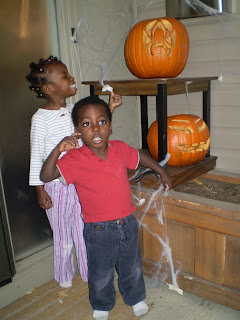This is reality, it makes people uncomfortable to talk about & to see the photos (see the link) but we have to pull our heads out of butts & do something - many people are dying everyday. Most of the deaths are between 2 - 5 years, that is the age of my little ones. There are so many great organizations that help the people of Haiti please support them in anyway that you can. I'll post some links of organizations / missionaries that I follow that do great things & rely on donations to perform their work. It may only be a drop in the bucket in the big scheme of things & will never eradicate the poverty & hardship Haiti is facing but they save many. Post to follow soon.
Thursday , November 20, 2008
http://www.foxnews.com/story/0,2933,455584,00.htmlPORT-AU-PRINCE, Haiti — The 5-year-old teetered on broomstick legs — he weighed less than 20 pounds, even after days of drinking enriched milk. Nearby, a 4-year-old girl hung from a strap attached to a scale, her wide eyes lifeless, her emaciated arms dangling weakly.
In pockets of Haiti accessible only by donkey or foot, children are dying of malnutrition — their already meager food supply cut by a series of devastating storms that destroyed crops, wiped out livestock and sent food prices spiraling.
http://www.foxnews.com/photoessay/0,4644,5741,00.html (Warning: Graphic Material)
At least 26 severely malnourished children have died in the past four weeks in the remote region of Baie d'Orange in Haiti's southeast, aid workers said Thursday, and there are fears the toll will rise much higher if help does not come quickly to the impoverished Caribbean nation.
Another 65 severely malnourished children are being treated in makeshift tent clinics in the mountainous area, or at hospitals where they were evacuated in Port-au-Prince and elsewhere, said Max Cosci, who heads the Belgian contingent of Doctors Without Borders in Haiti.
One evacuee, a 7-year-old girl, died while being treated, Cosci said, adding: "The situation is extremely, extremely fragile and dangerous."
At a makeshift malnutrition ward at a Doctors Without Borders hospital in the capital, 10 emaciated children were under emergency care Thursday, their stomachs swollen and hair faded by pigmentation loss caused by malnutrition. Several had the puffy faces typical of kwashiorkor, a protein-deficiency disorder.
Five-year-old Mackenson Duclair, his ribs protruding and his legs little more than skin stretched over bones, weighed in at 19.8 pounds, even after days of drinking milk enriched with potassium and salt. Doctors said he needed to gain another five pounds before he could go home.
Dangling from a scale mounted from the ceiling, 4-year-old Venecia Lonis looked as limp as a rag doll as doctors weighed her, her huge brown eyes expressionless, her hair tied with bright yellow bows.
Mackenson's grandmother, who has raised him since his mother died, said she barely has a can of corn grits to feed herself, the boy and her 8-year-old granddaughter each day.
"These things did not happen when I was growing up," 72-year-old Ticouloute Fortune said.
Rural families already struggling with soaring food prices in Haiti, the Western Hemisphere's poorest country, lost their safety nets when fields were destroyed and livestock wiped out by the storms, which killed nearly 800 people and caused $1 billion worth of damage in August and September.
U.N. World Food Program country director Myrta Kaulard said she fears more deaths from malnutrition in other isolated parts of Haiti, and search and medical teams were fanning out in the northwest and along the southwestern peninsula to check.
The World Food Program has sent more than 30 tons of food aid — enough to feed 5,800 people for two weeks — into the remote southeastern region since September, and other groups funded by the U.S. Agency for International Development have sent food as well, she said.
But the steep, narrow paths and poor visibility make it difficult to deliver the food to the mountain communities where hunger is worsening. In one case, a WFP truck flipped over while struggling up a hill and slid into a ravine, killing an aid worker.
"There is always a bottleneck. The same situation that the people are facing is the same situation we're also facing," Kaulard told The Associated Press Thursday.
The mountain villages have long suffered from chronic hunger, growing only enough staples to feed themselves less than seven months out of the year, she said.
But families normally have enough to last through December. This year, Haiti's agriculture ministry estimates 60 percent of the harvest was lost in the storms nationwide. Land quality is already poor and farmers lost seeds for next year when the storms hit, Kaulard said.
Effects of the storms vary widely from village to village and even family to family. In some places, food supplies seem intact. In others, Doctors Without Borders has found rates of severe malnutrition as high as 5 percent.
Aid shortages may soon compound the problem. Donor countries have funded only a third of the U.N.'s $105 million aid appeal for Haiti following the storms, and resources could run out in January, Kaulard said.
At the hospital Thursday, Enock Augustin sat beside the bed where his 5-year-old daughter Bertha was sleeping. The fragile-looking child was evacuated by helicopter Nov. 8 with vomiting and diarrhea. When she arrived, nearly a quarter of her body weight was due to fluid retention, a sign of severe protein deficiency.
The swelling gradually receded as she was fed nutrient-enriched milk and treated with antibiotics and anti-worm medicine; she shrank to just 21 pounds.
She has since gained about two pounds but can't go home until she reaches 26 pounds, doctors said.
For months, the Augustin family had gotten by despite the soaring prices of corn grits and imported rice because they grew potatoes, which they could eat or barter for plantains, yams and breadfruit that did not fluctuate with the world market.
But then, in August, Tropical Storm Fay hit, followed by Hurricane Gustav, Tropical Storm Hanna and Hurricane Ike.
"Every time a hurricane came through, it killed our animals and plants," said Augustin, a father of six. The road was washed out, markets became unreachable and "the price of everything went sky high."
The entire family subsisted on two cups of corn grits, and Bertha began shrinking — and then swelling — before his eyes.
"She was really bad. We put her in the helicopter and they brought her here," Augustin said. "I hope the government will hear about us and bring more support."
 My butterfly & reindeer - they loved getting their faces painted.
My butterfly & reindeer - they loved getting their faces painted. I took lots of photos as a comprise to get them to wash their face to go to bed. :)
I took lots of photos as a comprise to get them to wash their face to go to bed. :) Kids with their friend Noah.
Kids with their friend Noah. Dieunelson admiring Christolla's art.
Dieunelson admiring Christolla's art.
























